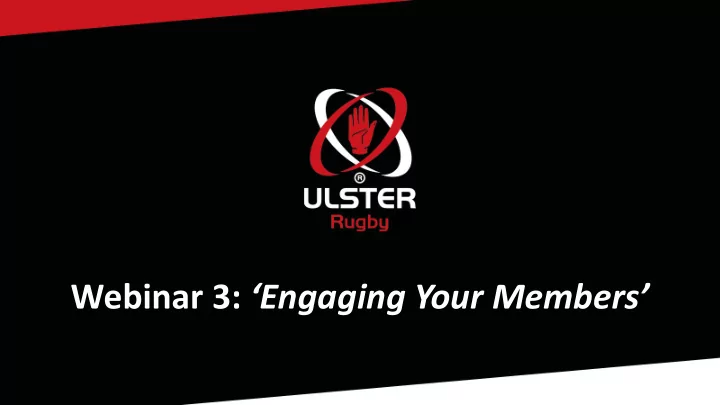

Webinar 3: ‘Engaging Your Members’
Introduction Charlie Farrell Club & Community Development Officer Email : Charlie.farrell@ulsterrugby.com Telephone: 07900204778 Matthew Holmes Club Services Officer (CSO) Email: Matthew.holmes@ulsterrugby.com Telephone: 07442490460
Aims By the end of this session we will…. • Have discussed the role and importance of knowing your membership • Discussed our ideas on how to assess wants/needs of your membership • Share some club examples and successes • Discussed importance of engaging with your membership around current return to rugby
Why is it important to engage with your members? • Purposeful engagement to drive improvement across the club. • Gather feedback, opinions and ideas (empower members) to help shape future activity. • Personal Benefits for members and the club as a whole.
Some reflective practice… 1.Do you regularly engage with your membership around what they would like? 2.How do you know the current needs of your membership? 3.Are you actively engaging all members/potential members within your club? 4.Do you think it would benefit your club to better consult members?
Our current situation Now is probably a good time to consult with your membership given the impact of Covid-19 on sport. Q: Have needs changed? Q: Does the club need to do something different for 20/21 season to re-engage current members in light of the disruption caused by Covid-19?
How do we learn about needs and wants? In our experience, the 3 best ways to learn the needs and wants of your membership are via: 1.Online Surveys (either for everyone in general or targeting a specific group) 2.Face to Face consultation (e.g. roundtable) 3.Continually connecting / interacting with members on a personal level
Online Surveys Step 1: Think Strategically – What is the purpose of the survey? What do you need to know? When do you need to know it by? Step 2: Shape your questions – Think about what you need to know and work back from there to create your questions, using a combination of both open and closed Step 3: Distribute – Send it out via appropriate means (e.g. your mailing list, social media/website, Whatsapp etc.). You may need to send reminders
Online Surveys Step 4: Collate responses – Online surveys do this for you and provide analytics (where applicable) Step 5: Compile a report – Review the information, identify themes and trends, priority areas etc. Step 6: Use the information – Integrate the information into Club Planning, use it to shape projects, enhance club provision etc., prioritizing the areas of greatest importance
Some Examples
Tips for a meaningful survey DO • Use Simple Language. • Adopt a targeted approach. • Expect answer you don’t want. • Share the results DON’T • Make it overly time consuming. • Ask unnecessary questions. • Carry it out by yourself
Some Real World Examples
Some Real World Examples
Some Real World Examples • Clear evidence of demand • Can support the club’s search for funding as ‘evidence’
Some Real World Examples • 43 ‘hot leads’ • Opportunity now exists to follow up if they left their contact details
Some Real World Examples
Some Real World Examples: Ulster Rugby Adult participation survey 2020, We asked If your club hosted less formal opportunities to play rugby activities during the week (Tag/Touch), how often do you feel you would attend? >50% of respondents said they would attend more than once per month, 20% responded that they would attend 'every week' Take home: demand exists for a new product which matches consumer needs.
Consultation Workshop Group sessions or ‘Club Planning Workshops’ are another great way to gather feedback on the operation of the club, future direction etc. • Unlike surveys, they allow for discussion on important topics, idea sharing, consideration of different perspectives etc. • Can bring people with similar roles together, or mix up different sections It might also be a good idea to have someone facilitate, potentially us to keep the workshop on track, manage dynamics, probe important areas etc.
Personal Connections Face to Face connection Disengaged/Ex-member Touch line/Clubhouse Follow up on why people left: • Feel unwanted or undervalued. conversation: • What brings them to the club? • The club’s offerings (products) • Volunteers/Supporters invested not match the members in club feel heard. (consumers) needs. Take Home: Conversation on a Take Home: Might be a glaringly Saturday morning makes obvious fix, preventing the loss of stakeholders feel welcome as well this person from the club. Re- as providing valuable insight. engagement of members.
The Here and Now Some thoughts: Q: How do all your members feel about returning to rugby activity? (both on pitch and off pitch) Q: What specific concerns do people have about coming back to the club? What are their attitudes towards specific risks? Q: What would they like to see in regards club activity returning?
The Here and Now Ensure you are re-engaging with the entire current membership Gather information which enables the club to provide an environment which they are comfortable returning to (make no assumptions) Your previous plans might need to be re-thought (e.g. your Club Development Plan for 2020/21). You might need to ask new questions ahead of this season starting, and you might also need to do things differently in the next 12 months.
Ulster Rugby Pilot We are seeking 5 clubs to support in rolling out some consultation as part of our Return to Rugby.
Responding to identified needs USE the knowledge you have gained! The findings can and should be used to shape how your club planning looks going forward. • Identify and prioritise the needs/wants of your membership. • Use working groups to plan the best way to address identified needs. • Gather/Recruit the necessary volunteers to action your plan. • Review plans to ensure they are meeting needs of current membership.
Questions
THANK YOU Charlie Farrell Club & Community Development Officer Email : Charlie.farrell@ulsterrugby.com Telephone: 07900204778 Matthew Holmes Club Services Officer (CSO) Email: Matthew.holmes@ulsterrugby.com Telephone: 07442490460
Recommend
More recommend